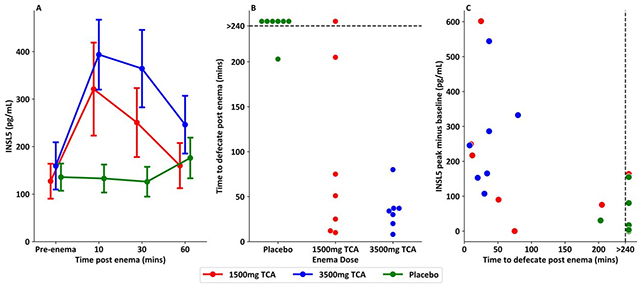Irritable bowel syndrome with diarrhea (IBS-D) is an unpleasant condition to live with, affecting millions of people worldwide. Now a new study has identified what could be a key trigger for the condition – a trigger which could be targeted by future treatments.
An investigation on 108 people with and without IBS-D and related conditions has revealed a hormone called insulin-like peptide 5 (INSL5) is released when bile acids that aid digestion find themselves further along the digestive tract than usual, in the large intestine.
This shouldn't happen, but when it does – due to certain conditions and gut malfunctions – more INSL5 gets produced, which causes diarrhea-like symptoms.
This is potentially responsible for around two out of every five cases of IBS-D, the researchers say, and may explain why a lot of existing drugs and strategies to combat IBS-D are ineffective.
Related: Surprising 'Nocebo Effect' Shows Gluten May Not Be The Problem in IBS
"When you go to the doctor with chronic diarrhea, they'll likely test for food intolerances, rule out an infection or look for signs of inflammation," says Chris Bannon, an endocrinologist at the University of Cambridge in the UK. "There has been significant research interest in the microbiome, but gut hormones have been neglected."
"It's becoming increasingly clear that gut hormones play an important role in things like gut health and weight management."

The study included participants with bile acid diarrhea (BAD) as well as IBS-D, helping the researchers identify a link between these conditions, the differences between them, and the triggers responsible for them.
At the moment, BAD is difficult to diagnose and is often classed as IBS, and the researchers hope that being better able to spot it will lead to treatments that can more effectively target the underlying causes.
It's also important to note that INSL5 is naturally produced by the body. Although it brings on diarrhea, it's actually a sign of the body trying to protect itself: it detects that bile acids shouldn't be in the colon, and flushes them out.
"It makes sense that you would have something that detects toxins and helps the body rid itself of them," says Bannon. "But a problem develops if it's always being triggered by bile acid, causing very dramatic symptoms."
Studies using mouse models had found that INSL5 could cause diarrhea, but this is the first time researchers have been able to show the same processes in people, and in ways that are connected to two recognized conditions.
The next steps are to look at potential treatments targeting INSL5. Some IBS-D patients in previous studies showed improved symptoms when given the anti-sickness medicine ondansetron – a known INSL5 blocker – which may indicate one route forward, although it's not yet clear why ondansetron works so well.
"This was a very exciting finding because it showed us that this hormone could be playing a big part in symptoms of this misunderstood condition," says Bannon.
"It also meant it might allow us to develop a blood test to help diagnose bile acid diarrhea if INSL5 levels are only high in these individuals."
The research has been published in Gut.
